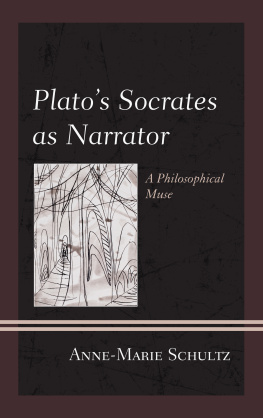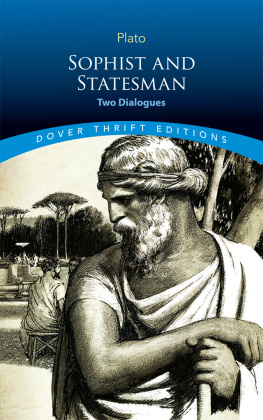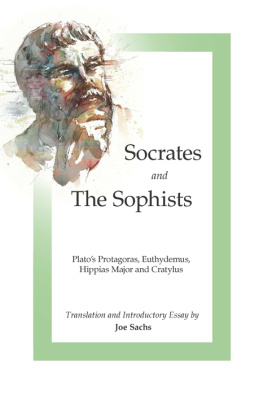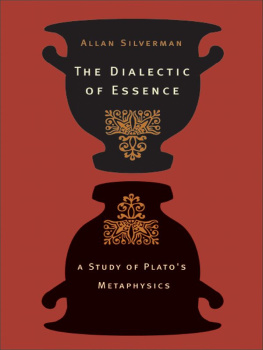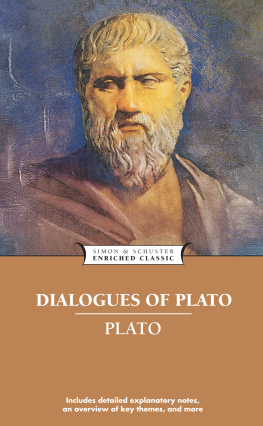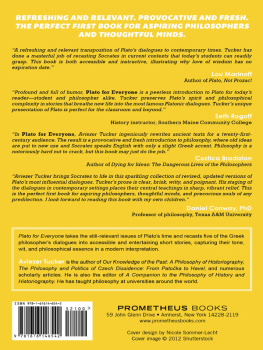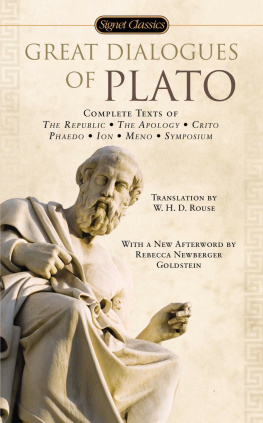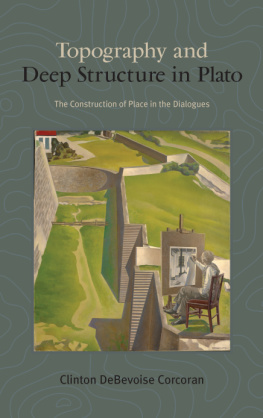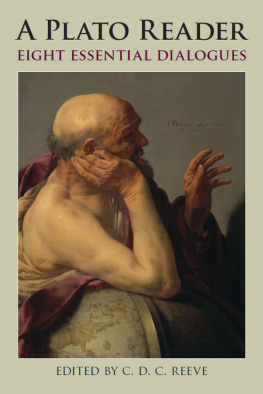Plato. - Protagoras and Meno
Here you can read online Plato. - Protagoras and Meno full text of the book (entire story) in english for free. Download pdf and epub, get meaning, cover and reviews about this ebook. City: London, year: 2008;2005, publisher: Penguin Group USA, Inc., genre: Art. Description of the work, (preface) as well as reviews are available. Best literature library LitArk.com created for fans of good reading and offers a wide selection of genres:
Romance novel
Science fiction
Adventure
Detective
Science
History
Home and family
Prose
Art
Politics
Computer
Non-fiction
Religion
Business
Children
Humor
Choose a favorite category and find really read worthwhile books. Enjoy immersion in the world of imagination, feel the emotions of the characters or learn something new for yourself, make an fascinating discovery.
- Book:Protagoras and Meno
- Author:
- Publisher:Penguin Group USA, Inc.
- Genre:
- Year:2008;2005
- City:London
- Rating:4 / 5
- Favourites:Add to favourites
- Your mark:
- 80
- 1
- 2
- 3
- 4
- 5
Protagoras and Meno: summary, description and annotation
We offer to read an annotation, description, summary or preface (depends on what the author of the book "Protagoras and Meno" wrote himself). If you haven't found the necessary information about the book — write in the comments, we will try to find it.
In this new edition, two of Platos most accessible dialogues explore the question of what exactly makes good people good.
Protagoras and Meno — read online for free the complete book (whole text) full work
Below is the text of the book, divided by pages. System saving the place of the last page read, allows you to conveniently read the book "Protagoras and Meno" online for free, without having to search again every time where you left off. Put a bookmark, and you can go to the page where you finished reading at any time.
Font size:
Interval:
Bookmark:

PROTAGORAS AND MENO
PLATO stands, with his teacher Socrates and his pupil Aristotle, as one of the shapers of the entire intellectual tradition of the West. Born c. 427 BC , he came from a family that had long played a prominent part in Athenian politics, and it would have been natural for him to follow the same course; the reason for his not doing so, according to the seventh of the collection of letters attributed to him (all of them almost certainly inauthentic), was his disillusionment with the kind of politics that could lead, among other things, to the execution in 399 of Socrates. Rather less plausibly, the same letter suggests that Plato's several visits to the court of Dionysius 11, tyrant of Syracuse in Sicily, were motivated by a desire to put his political theories as developed above all in his masterwork, Republic into practice. The reform of society on an ethical basis certainly remained one of his central theoretical concerns. However, the focus of his thinking was on ethics itself, in which he first followed and then went beyond Socrates, and on metaphysics and the understanding of reality. In the mid-380s, in Athens, he founded the Academy, the first permanent institution devoted to philosophical research and teaching, and an institution to which all Western universities like to trace their origins.
Plato wrote more than twenty philosophical dialogues, appearing in none himself (most have Socrates as chief speaker). His activity as a writer seems to have lasted over half a century; few authors in any language could claim to rival his particular combination of brilliant artistry and intellectual power. He died in 347 BC .
ADAM BERESFORD studied Classics at Balliol College, Oxford. He taught Latin and Greek at Dulwich College, London, from 1993 to 1995, and received a doctorate in Philosophy from Oxford in 2002. He teaches Philosophy and Classics at the University of Massachusetts, Boston.
LESLEY BROWN is Centenary Fellow in Philosophy at Somerville College, Oxford, and the author of numerous articles and book chapters on Plato and Aristotle.
PLATO
Translated by ADAM BERESFORD
with an Introduction by LESLEY BROWN
PENGUIN BOOKS
PENGUIN CLASSICS
Published by the Penguin Group
Penguin Books Ltd, 80 Strand, London WC2R 0RL , England
Penguin Group (USA) Inc., 375 Hudson Street, New York, New York 10014, USA
Penguin Group (Canada), 90 Eglinton Avenue East, Suite 700, Toronto, Ontario, Canada M4P 2Y3 (a division of Pearson Penguin Canada Inc.)
Penguin Ireland, 25 St Stephen's Green, Dublin 2, Ireland (a division of Penguin Books Ltd)
Penguin Group (Australia), 250 Camberwell Road, Camberwell, Victoria 3124, Australia (a division of Pearson Australia Group Pty Ltd)
Penguin Books India Pvt Ltd, 11 Community Centre, Panchsheel Park, New Delhi 110 017, India
Penguin Group (NZ), cnr Airborne and Rosedale Roads, Albany, Auckland 1310, New Zealand (a division of Pearson New Zealand Ltd)
Penguin Books (South Africa) (Pty) Ltd, 24 Sturdee Avenue, Rosebank, Johannesburg 2196, South Africa
Penguin Books Ltd, Registered Offices: 80 Strand, London WC2R 0RL , England
www.penguin.com
This translation first published in 2005
Translation and editorial material Adam Beresford, 2005
Introduction copyright Lesley Brown, 2005
All rights reserved
The moral right of the translator has been asserted
Except in the United States of America, this book is sold subject to the condition that it shall not, by way of trade or otherwise, be lent, re-sold, hired out, or otherwise circulated without the publisher's prior consent in any form of binding or cover other than that in which it is published and without a similar condition including this condition being imposed on the subsequent purchaser
ISBN: 9781101489109
The rough idea we have of the chronology of Plato's life and career is partly based on guesses made from his own writings. For other details we rely on ancient biographies, all of them written over four hundred years after his death (which we hope are partly based on earlier sources) and on the letters attributed to him, which may or may not be genuine. Dates for the composition of the many dialogues that he wrote are speculative, but scholars broadly agree on whether a given work comes from earlier or later in his career, and that the dialogues may be divided roughly into three groups. Protagoras and Meno probably both date to the 380s BC , along with four other works that are similar in length and style and touch on many of the same themes: Euthydemus, Symposium, Gorgias, Phaedo. Together these make up a set that represents his most ambitious work as a dramatist and some of his most original and inventive philosophy. Also given here are a few dates that are relevant to the historical and dramatic settings of these particular dialogues.
c. 468 BC Birth of Socrates.
450s 430s Athens, as a flourishing democracy, under the leadership of Pericles, becomes the dominant power in the Aegean.
432 Dramatic date for the Protagoras. (It is set nearly fifty years before the date of its composition.)
431 Start of the Peloponnesian War (between Athens and Sparta).
430429 Athens is hit by a catastrophic plague. Pericles dies.
c. 427 Birth of Plato, into a wealthy and aristocratic family.
c. 410s Plato first comes under the influence of Socrates.
415 Athens suffers a heavy defeat in an over-ambitious naval expedition against Syracuse, in Sicily.
Athens is decisively defeated by Sparta; the democratic government is replaced by a dictatorial oligarchy The Thirty Tyrants which includes two of Plato's close relatives, Critias and Charmides. (There is a tradition that Plato was invited to take part, and refused.) Within a few months there is a civil war, and the oligarchy is overthrown by the democratic faction, led by Thrasybulus and Anytus, among others. The democracy is restored.
(early) Dramatic date for the Meno.
402 Cyrus, ruler of Asia Minor, and brother of Artaxerxes, the Persian king, attempts to oust his brother. He leads a large expeditionary force into the heart of Persia, partly made up of Greek mercenaries, including Meno, who serves as a general.
401 Cyrus' expedition fails. Meno is captured and executed.
399 Socrates is prosecuted by Anytus and two others. The charges are that he doesn't believe in the gods of the city (a charge which implies subversion of traditional moral values) and that he corrupts young people. He is found guilty, in a public trial, by a jury of 500 Athenian citizens, and sentenced to death. Socrates' death may have prompted Plato to give up on the idea of entering political life, and devote himself fully to philosophy. It also seems to have given him a deep mistrust of democratic institutions.
389388 Plato travels to Sicily and southern Italy, where he visits and is influenced by Pythagorean schools there. (Pythagoreans believed in reincarnation, and apparently combined an interest in mathematics and geometry with number mysticism.)
390s380s Probable period for Plato's composition of Socrates' Defence Speech (Apology), Euthyphro, Crito, Charmides, Cratylus, Hippias Minor, Menexenus, Ion, Laches, Lysis, Protagoras, Euthydemus, Meno, Gorgias, Symposium and Phaedo.
c. 387 Plato founds the Academy in Athens, a kind of philosophical school and proto-university (so named after its location in a grove sacred to Academos, just outside the city).
Next pageFont size:
Interval:
Bookmark:
Similar books «Protagoras and Meno»
Look at similar books to Protagoras and Meno. We have selected literature similar in name and meaning in the hope of providing readers with more options to find new, interesting, not yet read works.
Discussion, reviews of the book Protagoras and Meno and just readers' own opinions. Leave your comments, write what you think about the work, its meaning or the main characters. Specify what exactly you liked and what you didn't like, and why you think so.



